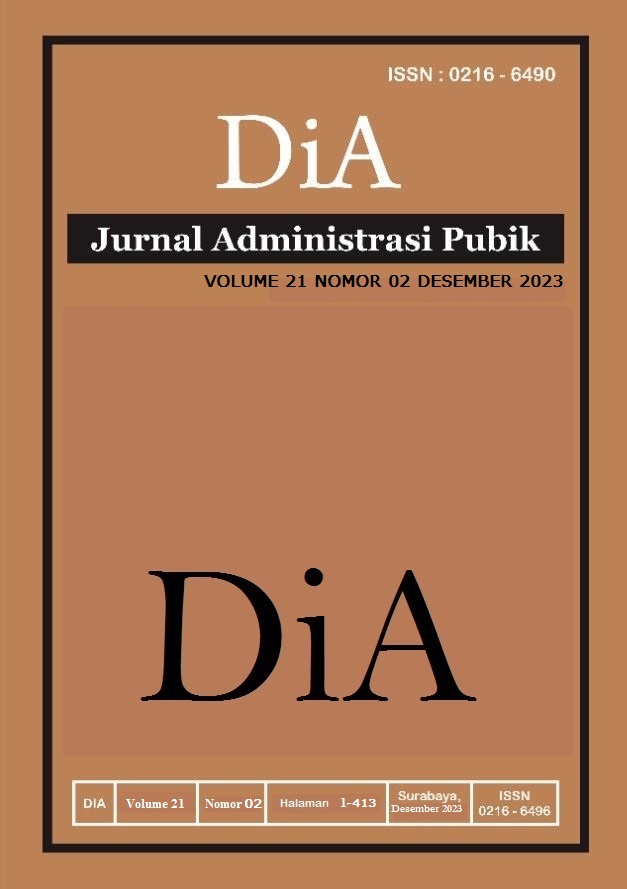TRANSFORMATIONAL LEADERSHIP IN BENOWO DISTRICT, SURABAYA CITY
DOI:
https://doi.org/10.30996/dia.v21i02.7973Keywords:
transformational leadership, public service, Benowo districtAbstract
The aim of the research is to analyze the implementation of the Camat's transformational leadership; analyzing the supporting and inhibiting factors, as well as evaluating the impact of the implementation of the transformational leadership of the Camat in Benowo District, Surabaya City. This study uses a qualitative descriptive approach to analyze the transformational leadership of the Camat in Benowo District, Surabaya City. The research subjects consisted of sub-district and sub-district officials, as well as representatives of community leaders. The research subjects were selected from people who often interact with the sub-district head of Benowo sub-district, Surabaya city. Data collection was carried out by means of in-depth interviews and checking the validity of the data through source triangulation. Research data were analyzed using qualitative data analysis according to Creswell. The conclusions obtained are: 1) The transformational leadership of the Camat in Benowo District, Surabaya City is implemented by making himself a role model, realizing the vision and mission, stimulating employees to be innovative and creative, and providing fair and personal attention; 2) Supporting factors include work experience, education level, optimistic and friendly attitude, and employee support, while inhibiting factors include: low work motivation, low competence, limited number of human resources, and high workload; 3) The impact of implementation is reflected in the better quality of service and the increased contribution of employees in providing suggestions about their creativity in meetings that discuss innovation related to service to the community.
Downloads
References
Asbari, M., Santoso, P. B., & Purwanto, A. (2019). Pengaruh kepemimpinan dan budaya organisasi terhadap perilaku kerja inovatif pada industri 4.0. Jurnal Ilmiah Manajemen, 8(1), 7-15.
Asbari, M., Purwanto, A., & Santoso, P. B. (2020). Pengaruh iklim organisasi dan kepemimpinan transformasional terhadap produktivitas kerja inovatif pada industri manufaktur di Pati Jawa Tengah. Jurnal Produktivitas, 7, 62-69.
Bass, B. M., Avolio, B. J., Beson, Y., Jung, D. I. (2003). Predicting unit performance by assesing transformational and transactional leadership. Journal of Applied Psycology, 88(2), 207-218.
Bass, B. M. & Riggio, R. E. (2006). Transformational leadership (2nd ed). New Jersey: Lawrence Erlbaum Associates, Publishers.
Bass, B. M., & Avolio, B. J., (2002). Developing Potential Across a Full Range of Leadership: Cases on Transactional and Transformational Leadership. New Jersey: Lawrence Erlbaum Associates, Publishers Mahwah.
Creswell, J. W. (2012). Educational research planning, conducting, and evaluating quantitative and qualitative research (4th ed.). Boston: MA Pearson.
Fanani, A. F., Iqbal, M. M., Astutik, W., & Lestari, Y. (2020). Kepemimpinan transformasional sektor publik. Journal of Public Sector Innovations, 4(2), 84-90.
Gill, A., Fitzgerald, S., Bhutani, S., Mand, H., Sharma, S. (2010). The relationship between transformational leadership and employee desire for empowerment. International Journal of Contemporary Hospitality Management, 22(2), 263–273.
Gufron, U. (2017). Etika birokrasi al-ghazali. Saintifica Islamica: Jurnal Keismlaman, 4(2), 221-246.
Hayatuddiniyah. (2022). Kepemimpinan transformasional perpustakaan di era disrupsi 4.0. Publis Journal, 6(1), 44-58.
KPPN Baturaja. (2021). Inilah beberapa cara menigkatkan pelayanan publik. Diakses dari https://djpb.kemenkeu.go.id/kppn/baturaja/id/data-publikasi/artikel/2925-inilah-beberapa-cara-peningkatan-kualitas-pelayanan-publik.html
Karim, F. R. (2018). Kepemimpinan transformasional Camat dalam meningkatkan kinerja pegawai kantor Kecamatan Mantikulore Kota Palu. E-Jurnal Katalogis, 6(1), 127-136.
Kushandajani, K. (2011). Rekonstruksi hukum pemerintahan desa pemikiran perubahan kebijakan bagi desa. Politika, Jurnal Ilmu Politik, 2(1).
Meilinda, S. D., Lustiadi, Y., & Hermawan, W. (2019). Milennial behavior: Sebuah pendekatan da lam perilaku kepemimpinan. Wacana Publik, 13(2), 121– 127.
Moleong, Lexy J. (2017). Metode penelitian kualitatif (cetakan ke-36). Bandung: PT. Remaja Rosdakarya Offset.
Muhammad. (2018). Birokrasi (kajian konsep, teori,menuju good governance). Lhokseumawe: Unimal Press.
O’Leary, E. (2001). Kepemimpinan (1st ed). Yogyakarta: Andi.
Suprapti, S., Asbari, M., Cahyono, Y., Mufid, A., & Khasanah, N. E. (2020). Leadership Style,Organizational Culture and Innovative Behavior on Public Health Center Performance During Pandemic Covid-19. Journal of Industrial Engineering & Management Research, 1(2), 76-88.
Purwanto, A., Bernarto, I., Asbari, M., Wijayanti, L. M., Hyun, C. C. (2020). Effect of Transformational and Transactional Leadership Style on Public Health Centre Performance. Journal of Reseacrh in Business, Economics, and Education, 2(1), 304-314.
Rosita, R. & Iskandar, S. (2022). Gaya kepemimpinan kepala sekolah di era digital. Jurnal Basicedu, 6(4), 6005-6011.
Sartika, D. (2015). Inovasi Organisasi Dan Kinerja Organisasi: Studi Kasus Pada Pusat Kajian dan Pendidikan dan Pelatihan Aparatur III Lembaga Administrasi Negara. Jurnal Borneo Administrator, 11(2), 129-151.
Stone, A. G., Russel, R. F., & Patterson, K. (2004). Transformational versus servant leadership: A difference in leader focus. Leadership & Organization Development Journal, 25(4), 349-361
Yukl, G. A. (2007). Leadership in organizations. London: Pearson Education.
Wuradji. (2009). The educational leadership (kepemimpinan transformasional). Yogyakarta: Gama Media
Herman. (2021). Kepemimpinan pendidikan transformasional di era revolusi industri 4.0. Jurnal Dedikasi Pendidikan, 5(2), 361-373
Yufia & Sihotang, H. (2020). Kepemimpinan transformasional dan pemberdayaan guru dalam tranformasi pendidikan 4.0. Jurnal Dinamika Pendidikan, 13(2), 204-215.
Downloads
Published
How to Cite
Issue
Section
License
The DiA journal allows authors to retain the copyright of their papers without limitation. Authors may grant publishers non-exclusive publishing rights to publish articles. Granting first publishing rights to publishers also qualifies as unlimited copyright (because there are no restrictions imposed by publishers on author copyright).







